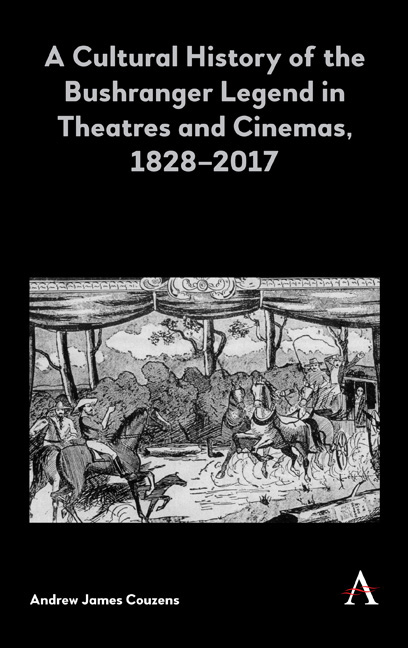Book contents
- Frontmatter
- Contents
- List of Figures
- Acknowledgements
- Introduction: Defining the Bushranger Legend
- Part 1 Establishing the Legend
- Part 2 Developing the Legend
- 5 The Bushranger Genre from Stage to Screen
- 6 The Bushranger Ban
- 7 British and American Interventions in the Bushranger Legend
- 8 Radical Nationalism and the Bushranger Legend
- Part 3 Fragmenting the Legend
- Conclusion
- Bibliography
- Index
8 - Radical Nationalism and the Bushranger Legend
from Part 2 - Developing the Legend
Published online by Cambridge University Press: 14 February 2019
- Frontmatter
- Contents
- List of Figures
- Acknowledgements
- Introduction: Defining the Bushranger Legend
- Part 1 Establishing the Legend
- Part 2 Developing the Legend
- 5 The Bushranger Genre from Stage to Screen
- 6 The Bushranger Ban
- 7 British and American Interventions in the Bushranger Legend
- 8 Radical Nationalism and the Bushranger Legend
- Part 3 Fragmenting the Legend
- Conclusion
- Bibliography
- Index
Summary
The bushranger ban, imperial involvement in local film production and financial risks associated with bushranger films resulted in a dramatic departure from the bushranger legend as it existed in the early silent bushranger films. However certain cultural and political entities saw the benefit in defining an independent Australian character based upon a colonial bush folklore of which the bushranger legend was an indelible part. This loosely defined radical nationalist movement began to formalize not only their own definition of Australian character but also its relationship to the bush and the bushranger legend in scholarship and art. This movement achieved a renaissance in Australian cultural production including the 1970 Australian Film Revival. The films of the revival had a keen interest in questions of Australian identity and inevitably drew upon the radical nationalist approach as the foundation for their vision of Australian character. The importance of these films to Australia's cultural and cinematic legacy has resulted in their representation of the bushranger legend underpinning many later conceptualizations.
This chapter outlines the development of the political and social influences that the radical nationalist movement consisted of. It identifies the stakeholders and motives at work in formalizing conceptualizations of Australian character and their implications for the bushranger legend in the partly lost film Captain Thunderbolt (Cecil Holmes, 1953). It then charts the movement's role facilitating government support for the film industry and how this resulted in two competing yet similar cinematic approaches to the bushranger legend. The first, embodied in Mad Dog Morgan (Philippe Mora, 1975), attempts to define the contemporary countercultural movement as a continuation of the bushranger legend. The other, as depicted in Robbery Under Arms (Donald Crombie and Ken Hannam, 1985), incorporates the bushranger legend into a dominant, inoffensive national mythology.
Folklore, nationalism, and Captain Thunderbolt
One organization that reflected some of the attitudes of the radical nationalist movement with particular relevance to the bushranger legend was the Ned Kelly Defence League. Founded in 1934 with the involvement of journalist, unionist and Kelly historian J. J. Kenneally, the League claimed three objectives: ‘to liberate the long suppressed truth about the Kellys; to secure justice to those to whom it has been so persistently denied during the past 50 years; to return to the Kelly family the famous armour Ned Kelly wore at the time of his battle with the police at Glenrowan’.
- Type
- Chapter
- Information
- Publisher: Anthem PressPrint publication year: 2019



